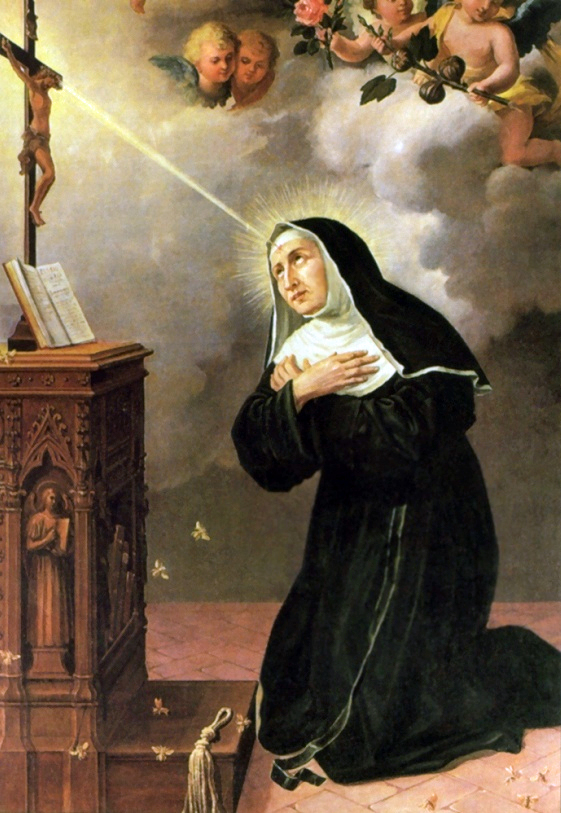An account of St. Rita's life is as follows:
High in the hills of the republic of Cascia, in a tiny Umbrian village called Roccaporena, Antonio and Amata Lotti were well-respected peacemakers. In 1381, they welcomed their only child, Margherita. In the local dialect, her name meant “pearl," but she was known simply as Rita. Baptized in the church of Saint Augustine in Cascia, Rita became acquainted with the local Augustinian nuns of Saint Mary Magdalene Monastery and was attracted to their way of life. But her parents arranged a marriage for her in order to provide safety and security, and so Rita obediently married Paolo Mancini with whom she had two sons.
In the troubling political climate of the times, there was often open conflict between families. Paolo was the victim of one such conflict, and he was murdered when their sons were still young. The expectation of society at the time was that the boys should avenge the murder of their father to defend the family honor. Rita, however, influenced by the peacemaking example of her parents, pledged to forgive her husband’s killers. She faced a steep challenge, however, in convincing her sons to do the same. Tradition has it that she often pointed out to them the image of the crucified Christ and the fact that he forgave those who killed him. Within a year, however, both sons succumbed to a deadly illness leaving Rita not only a widow, but also childless. Following these tragedies, Rita placed her trust in God, accepting them and relying on her deep faith to find her way. After eighteen years of marriage, Rita felt called to a second but familiar vocation: to religious life in the Augustinian convent. (Read more.)
This is one of the most beautiful pieces of writing I have ever read. To quote Fr. Mark:
Catholicism is a fleshy affair: it is the religion of thorns in the flesh and roses in the snow. It is the religion of little children making furtive neighborhood pilgrimages, weaving crowns of flowers for the Mother of God, and secretly lighting candles to the saints. It is the religion of men quietly telling their beads, interceding for their families. It is the religion of those who kneel in prayer at the tombs of the saints and shed tears over holy relics. Catholicism is the religion of little old ladies stopping in church laden with plastic shopping bags and burdened, even more, with concern for their children and their children’s children. It is the religion of the lonely, the confused, the broken, and the wounded who know that, in spite of everything, there is no shame in going to the Crucified Jesus, for He was “despised and rejected by men, a man of sorrows and acquainted with grief” (Is 53:3).
Catholicism is the religion of those tormented by gnawing hungers of the heart and thirsts of the spirit who, with faith and the fear of God, approach the inexhaustible Chalice of the Holy Mysteries for healing and relief. It is the untidy religion of those who trust that God and his saints can sort out whatever mess we have made of our lives and, in the end, by grace alone set all things aright. It all makes one supremely happy, and grateful, to be Catholic.
This was the religion of Saint Rita of Cascia, the wife of a husband who was murdered, the mother of two sons set on vengeance, a widow marked by emotional scars and lacerated by the cruel tongues of the pious. Finally, the doors of the cloister opened to admit her for the last stage of her life, one marked by sickness. Saint Rita’s life was messy.
Saint Rita lifted her eyes to meet the gaze of Christ and lived in His radiance; He blessed her with a thorn from His bloody crown and with a rose to console her in her final hour. By means of these very material signs, “the Counselor, the Spirit of Truth” (Jn 15:26) bore witness in Saint Rita’s life and in the Church to the abiding presence of the Crucified and Risen Lord.
Saint Rita, pray for us today, that we may not live in denial of the messiness of our lives but, rather, find comfort in the bosom of a Church warm with the intercession of the saints, a Church wide open to little children, a Church hospitable to failures and to fools, a Church who knows the value of the “little things” by which all of life can be suffused by paschal grace. (Read more.)























3 comments:
+JMJ+
I happened to have an unread life of St. Rita in my library, Elena, and I started reading it as I prayed the novena in anticipation of this day. So Fr. Mark's words are touching me in more than one place today. Thanks for putting up the link!
You are welcome! I feel that St. Rita is interceding for us all.
I was never fond of St. Rita until I ran into this film at Youtube. http://youtu.be/qRFBuMfWEXQ
Post a Comment